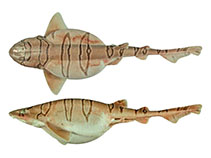| Family: |
Scyliorhinidae (Cat sharks), subfamily: Scyliorhininae |
| Max. size: |
46.3 cm TL (male/unsexed); 52 cm TL (female) |
| Environment: |
bathypelagic; marine; depth range 294 - 420 m |
| Distribution: |
Eastern Indian Ocean: Australia. |
| Diagnosis: |
A small species with the following characters: head 8.9-13.1% TL in height, trunk width 12.9-19.1% TL; origin of first dorsal-fin usually over mid pelvic-fin base; prenarial length 4.5-5.2% TL; preorbital snout length 1.4-1.6 times prenarial length, 2.6-3.1 in prepectoral length, 5.9-6.7 in prepelvic length; snout-vent length long, 46.2-51.2% TL; nostril 2.5-3.1% TL in width; eye-spiracle space wide, 0.8-1.2% TL; pectoral fin moderate-sized, height 8.7-12.2% TL, posterior margin length 7.4-11.4% TL; anal fin relatively low, height 2.8-3.7% TL; anal-caudal space 5.4-6.5% TL; precaudal length 76.4-79.2% TL; interdorsal space 7.4-9.6% TL; teeth with 3-5 cusps near symphysis of upper jaw; flank denticles are mainly unicuspidate; back without greatly enlarged denticles; long adult clasper, up to 9.3% TL, reaching anal-fin origin; vertebral centra 100-108; low tooth count, each jaw with teeth between 45 and 63; dorsal surface with a striking pattern of dark brown, open-centered saddles (Ref. 76949). |
| Biology: |
|
| IUCN Red List Status: |
Least Concern (LC); Date assessed: 23 April 2015 Ref. (130435)
|
| Threat to humans: |
harmless |
Source and more info: www.fishbase.org. For personal, classroom, and other internal use only. Not for publication.
